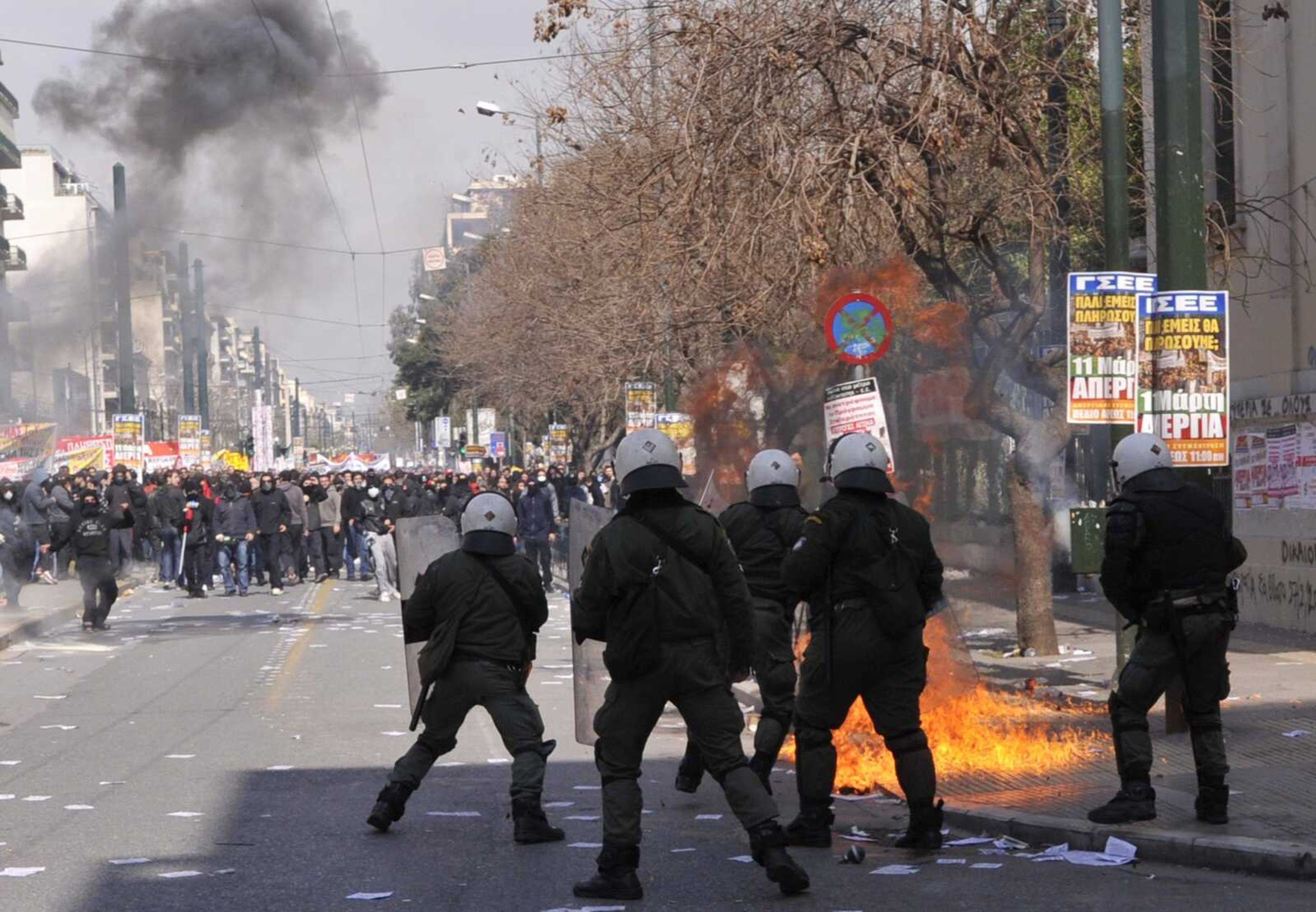Debt-ridden Greece hit by strikes
ATHENS, Greece -- Clashes between riot police and rock-throwing, masked youths broke out during a demonstration Thursday in central Athens by tens of thousands of striking workers protesting austerity measures the Greek government has said it has no choice but to implement...
ATHENS, Greece -- Clashes between riot police and rock-throwing, masked youths broke out during a demonstration Thursday in central Athens by tens of thousands of striking workers protesting austerity measures the Greek government has said it has no choice but to implement.
The debt-ridden country is under intense pressure from both markets and the European Union to reduce its deficit from 12.7 percent of economic output in 2009 to 8.7 percent this year. Last week, Greece introduced a $6.5 billion austerity package that cut civil servants' wages, froze pensions and raised consumer taxes.
The new cutbacks, added to a previous $15.24 billion austerity plan, sparked a wave of strikes and protests from labor unions whose reaction to the initial measures had been muted. Thursday's 24-hour general strike, the second in about a week, grounded airline flights, halted public transport, suspended news broadcasts and left public hospitals working with emergency staff.
Demonstrators took to the streets of Athens and Thessaloniki, banging drums and chanting slogans such as "no sacrifice for plutocracy," and "real jobs, higher pay." They were joined by uniformed police, coast guard and fire service officers.
"The fight must be constant until the stability pact -- these unpopular measures passed by the government -- is overturned," said demonstrator Olga Raptou.
An unofficial police estimate put the Athens crowd at about 20,000; organizers said the actual number was much higher.
Clashes broke out soon after the march began, with riot police firing tear gas and stun grenades to disperse masked youths who smashed pavement, marble steps and building facades to use as projectiles to throw at police. Businessmen in suits scurried for cover, their eyes streaming.
About 200 black-clad youths in crash helmets and ski masks fought sporadic street battles with the police through central Athens, smashing shop, bank and hotel windows and bus stops, setting trash bins on fire, and punching and kicking motorcycle police. After the march ended, the violence spread to a nearby square where tear gas sent customers running from open-air cafes.
Police said 13 policemen were injured and 16 people were detained, nine of whom were arrested.
Limited clashes also broke out during a demonstration by about 14,000 people in the northern city of Thessaloniki.
While public anger has grown, it has been mitigated by a general understanding that something must be done to pull the country out of a crisis that has made its cost of borrowing skyrocket.
An opinion poll published last weekend, just after Parliament approved the measures, found Greeks split -- with 47 percent opposing the austerity package and 46 percent supporting it. The poll, in To Vima newspaper, did not give a margin of error.
"It is to be expected that there will be reaction to these measures. We took very difficult decisions that were very unpleasant, and they personally upset me a great deal," deputy prime minister Theodore Pangalos said Wednesday.
"But we cannot do anything differently."
Prime Minister George Papandreou's Socialists, who came to power in a landslide election victory in October, enjoy a comfortable majority with 160 of Parliament's 300 seats and easily pushed the measures through Parliament on March 5.
"We have made a choice which could lead the country to a radical clean up of the past," Pangalos said on Mega TV. "We will find the way forward and we will not turn back. And no one can obstruct this given that a large section of Greek society supports us."
Unions have been increasingly vocal in their opposition.
While their colleagues clashed with groups of protesters in Athens, some police joined the demonstration.
"The police and other security forces have been particularly hard hit by the new measures because our salaries are very low," said Yiannis Fanariotis, general secretary of one police association, who was among some 200 uniformed police, coast guard and fire brigade officers, who cannot strike but can hold protests.
He said the average policeman made about $1,360-$1,635 a month, if weekend and night shifts were included.
"The reduction in our salaries has reached 30 percent," said coast guard Lt. Giorgos Dirvakos. "And if we figure into that the increase in taxes, every family of a coast guard, police officer and firefighter will see its income reduced to 8,000 euros ($10,900) annually."
The government says the cuts are its only way to dig Greece out of a crisis that has hammered the euro and alarmed international markets, inflating the loan-dependent country's borrowing costs.
But unions say ordinary Greeks are being forced to pay a disproportionate price for past fiscal mismanagement.
"They are trying to make workers pay the price for this crisis," said Yiannis Panagopoulos, leader of Greece's largest union, the GSEE. "These measures will not be effective and will throw the economy into deep freeze."
A general strike March 5 was also marked by violence, with riot police clashing with rock-throwing protesters. Leftist protesters roughed up Panagopoulos as he addressed a rally.
Papandreou, who has been on a four-nation tour to drum up support for his austerity package, told Greek reporters in Washington on Wednesday that he understood the reactions to the measures, but that demonstrations could harm Greece's image abroad.
Connect with the Southeast Missourian Newsroom:
For corrections to this story or other insights for the editor, click here. To submit a letter to the editor, click here. To learn about the Southeast Missourian’s AI Policy, click here.









